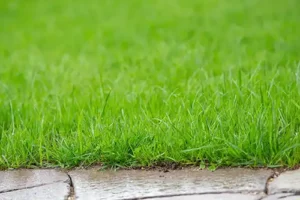Different environmental factors, especially rain, can affect the success of your lawn’s fertilization. How much rain falls and when it arrives can result in various outcomes. Here are the two primary ways rain can impact your lawn after fertilizing:

- Heavy Rain Immediately After the Treatment: Intense rainfall shortly after fertilizing can wash away the nutrients, preventing your grass from absorbing them. It may also cause the fertilizer to spread unevenly, leading to patchy growth or lawn damage, like burning. It’s best to delay fertilization if heavy rain is forecast.
- Light Showers a Couple of Days After the Treatment: Light rain a few days after fertilization is unlikely to cause harm, especially if most of the fertilizer has already been absorbed. In fact, it can help improve nutrient uptake, particularly with water-soluble granular fertilizers, which may dissolve more easily with a bit of moisture.
Need Lawn Care? We Can Help.
Click the button below to leave your information & we'll be in touch in an hour or less.
Need Pest Control Service?
Leave your information below and we’ll be in touch with a FREE quote!
"*" indicates required fields
*During normal business hours. After hours calls will be returned the next business day.
Can I Water My Lawn After Applying Fertilizer?
Allow at least 24 hours before watering your lawn after applying fertilizer. Watering too soon may wash the fertilizer away, reducing its effectiveness. On the other hand, delaying watering too long can stress your grass, especially in hot weather. Some granular fertilizers also need water to help them break down and deliver nutrients to the roots.
If you’re uncertain about how long to wait before watering after fertilizing, check the manufacturer’s packaging for guidelines. Most will provide aftercare instructions. Alternatively, you can consult a lawn care expert for tailored advice.
How Can I Tell If Rain Washed Away My Fertilizer?
Identifying if your fertilizer treatment was washed away by rain isn’t always straightforward, particularly when using liquid treatments that don’t leave visible marks on your lawn. Watch for these signs to determine if the treatment was lost:
- Soil Erosion: Heavy rainfall that leads to soil erosion can move much of the fertilizer from its intended location. Signs of this include exposed roots, gullies, and streaks in the dirt.
- Scorched Patches: Rain can carry fertilizer across your lawn, resulting in areas with overly concentrated nutrients. This can cause yellowing or burnt patches on the grass.
- Uneven Growth: If you notice sections of vibrant grass next to patches that are patchy or scorched, it may indicate that the rain washed the fertilizer away, dispersing it unevenly across the lawn.
Should I Apply More Fertilizer After Heavy Rain?
Florida weather is often unpredictable, and despite planning ahead, you might face an unexpected storm after fertilizing your lawn. Instead of reapplying immediately, it’s best to wait a few days to assess the situation.
Reapplying immediately could cause scorching in certain areas, especially if some spots got a higher concentration of fertilizer during the storm. Instead, reach out to a lawn care professional for guidance. They can safely reapply the treatment for optimal results without harming your lawn.
How does rain impact my lawn after fertilization Serving Ocala, St Augustine, Fruit Cove, Palm Valley ?
Atlantic Beach | Jacksonville Beach | Spring Lake | Brooksville | Ridge Manor | Nocatee | Yulee | Fernandina Beach | Duval County | Hernando County | Marion County | St Johns County
Home » Lawn Care » Lawn Learning Center » How to Take Care of Your Lawn’s Soil » How does rain impact my lawn after fertilization?
